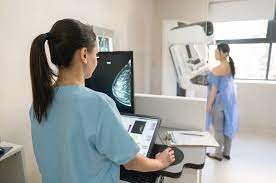Breast health is a topic that should be of utmost importance to all women. It goes beyond aesthetics and delves into our overall well-being. One aspect of breast health that often goes unnoticed is breast density.
What is Breast Density?
Breast density refers to the ratio of glandular tissue, connective tissue, and fat in the breasts. This composition can vary from person to person and even change over time. Dense breasts have more glandular and connective tissue and less fatty tissue. On mammograms, glandular and connective tissue appear white, making it harder to detect potential abnormalities.
Why is Breast Density Important?
Breast density is crucial because it can impact the accuracy of mammograms and the detection of breast cancer. Women with denser breasts have a higher risk of developing breast cancer, and the tumors can be more challenging to identify on mammograms due to the overlapping white tissue. Therefore, understanding your breast density can help you and your healthcare provider determine the most suitable screening methods.
How is Breast Density Measured?
Breast density is typically categorized into four levels: predominantly fatty, scattered density, heterogeneously dense, and extremely dense. Radiologists determine this classification by analyzing mammogram images.
The Link Between Breast Density and Cancer
Research has shown a clear link between breast density and breast cancer risk. Women with higher breast density have a greater likelihood of developing breast cancer. This is why it’s crucial for women with dense breasts to be proactive about their breast health and screenings.
Factors Affecting Breast Density
Various factors can influence breast density, including genetics, age, hormonal changes, and certain medications. Understanding these factors can provide insights into your individual risk factors for breast cancer.
Screenings for Women with Dense Breasts
For women with dense breasts, additional screenings beyond mammography might be recommended. These screenings can include ultrasound, MRI, or molecular breast imaging. These techniques offer a more comprehensive view of breast tissue, improving the chances of detecting potential issues.
Lifestyle Changes for Breast Health
Maintaining a healthy lifestyle can contribute to breast health. Engaging in regular physical activity, maintaining a balanced diet, limiting alcohol consumption, and avoiding smoking can all positively influence breast density and overall well-being.
Dispelling Common Myths
There are several misconceptions about breast density. It’s important to dispel these myths and provide accurate information to empower women to take charge of their health.
Talking to Your Healthcare Provider
If you’re unsure about your breast density or what screenings are appropriate for you, consult your healthcare provider. They can guide you through the process and recommend the best course of action based on your individual health profile.
Self-Examination and Awareness
Regular self-examinations can help you become familiar with the normal texture and appearance of your breasts. This makes it easier to detect any changes or abnormalities that might arise.
Genetic Predisposition and Breast Density
Genetics play a significant role in breast density and cancer risk. If you have a family history of breast cancer or other relevant genetic factors, it’s essential to discuss this with your healthcare provider.
Pregnancy and Breast Density
Pregnancy and breastfeeding can cause changes in breast density. It’s important to understand how these changes can impact your health and screenings.
Menopause and Changes in Breast Density
As women go through menopause, hormonal changes can lead to changes in breast density. Staying vigilant about screenings and breast health during this phase of life is crucial.
Conclusion
Understanding your breast density is a fundamental aspect of maintaining your breast health. It’s not just about knowing your risk factors but also taking proactive steps to ensure early detection and proper care if needed. By staying informed and working closely with your healthcare provider, you can make empowered decisions about your breast health.








